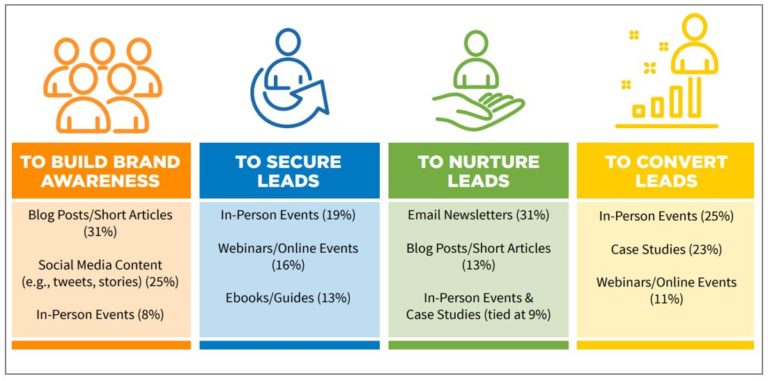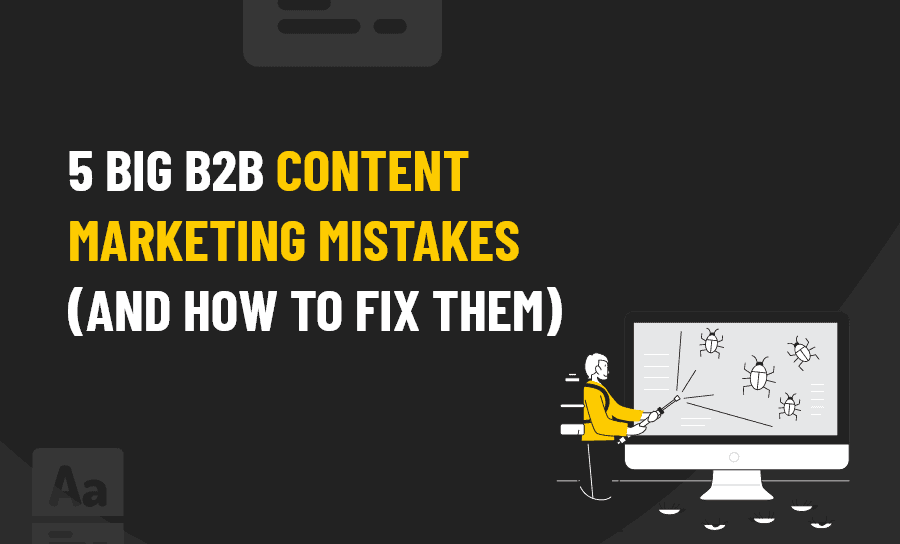It’s been the case for years now. Content is the fuel needed to power – and even ignite – successful B2B marketing campaigns. It exists in lots of forms – blog posts, long-form articles, white papers, images, videos and more – but the end goal of any B2B marketing content should always be the same; to drive business growth and boost your bottom line.
Creating great B2NB content is one thing, but optimizing, tracking and managing it is just as important. If you don’t tackle all of these things together effectively, you will basically be wasting your time, churning out content that only you and your employees (and maybe their mothers?) bothers to take any notice of.
The five biggest problems with B2B content, based on our observations and experiences can be broken down as follows:
- It’s all about you, not your target audience
- You ignore SEO
- You don’t have a content marketing strategy
- Your content fails to align with the B2B buying cycle
- You don’t manage your content through its complete lifecycle
These are all issues that can be solved though, and perhaps more easily than you think. That’s what we are going to take a closer look at here.
B2B Content Problem 1: It’s All About You
Good B2B content should not always be about what you want to share – your sales pitch, your advantages, why your products or service overcomes a particular issue – unless it serves your audience’s interest and is genuinely useful to them, as a standalone offering.
The best B2B content is useful, engaging, informative or even simply entertaining. It makes your audience feel like they gained something by giving your content a few minutes of your time. Hopefully a lot. It’s things like how-to posts, industry news, tips and tricks, explainer videos and more. What good content is not is one long sales pitch for whatever it is you sell.
To solve this problem, take a look at your current content and the content you have published in the past. If you were a prospect, would you really find it interesting? Be honest this time. Is it all really just soft (or even hard) sell dressed up as a blog post/video/report. If you discover that you are (reluctantly) nodding, then it’s time to make some changes.
And here’s an extra tip, think outside the box when it comes to the kinds of the content you create to offer even more value. Traditional blog posts aside have you considered offering ebooks, ready-made templates that meet an industry need, timely infographics case studies and/or podcasts? These forms of content are gaining popularity all the time in the B2B world and done right; they are incredibly effective for branding and traffic and lead generation purposes.
B2B Content Problem 2: You Ignore SEO
Whatever your level of familiarity with SEO, and specifically B2B SEO, you almost certainly know it is a ‘thing’. And it’s not just something to be considered for written content like white papers and blog posts; it matters for those branded images and carefully produced videos.
Many B2B content creators ignore SEO not because they are unaware of its potential to get their content in front of more prospects but because they don’t know how to execute it in 2020, and what will and won’t ‘get them into trouble’ with search engines and readers alike.
They have lots of questions. How do you use keywords effectively without committing the sin of keyword stuffing, which upsets search bots and readers? How to you add keywords to a YouTube video? How do you get backlinks that will boost your reputation not tarnish it? How do you even find keywords anyway?
As an SEO agency, we know that the bad apples in our industry have frightened a lot of folks off SEO. They are afraid that ‘SEO optimizing’ content will make it sound boring, stilted or false. They are afraid that bad backlinks will not only harm their content’s chance of ranking well, but the whole website’s as well.
These are valid concerns. Bad SEOs do bad things. The solution is an easy one here, though. Do your homework, do your due diligence and work with SEOs that understand SEO as it exists in the 21st century. Or, take courses and educate yourself so you can do it yourself (and, by the way, we often find that a combination of the two works really well. We love our SEO savvier clients)
B2B Content Problem 3: You Don’t Have a Content Marketing Strategy
Good content is great to have, but you need a strategy, and someone to manage it. You also need to keep a close eye on metrics – all kinds of metrics – and be ready to adjust your content marketing strategy accordingly.
This is true of all your content. Each piece should have a set place in an overall strategy. While each company’s plan will vary, and, of course, be unique to them, any good content strategy should address these basics:
- Who are you creating content for?
- What types of content are you going to create?
- Who is going to create the content?
- How often are you going to publish new content (of any kind)?
- What methods, outside of SEO, are you going to use to promote your content (social media, cross-platform promotion, email newsletters, paid ads etc.)
- How are you going to track your content’s performance?
- How to create an effective blog
Setting a content strategy – and following through on it – will take extra time and effort, but it WILL be worth it.
B2B Content Problem 4: Your Content Fails to Align with the B2B Buying Cycle
The fact is that not all types of content with all stages of the sales funnel. According to a report from the Content Marketing Institute, their 2020 Benchmarketing Report, which surveyed hundreds of companies who had stated they made use of content marketing on a regular basis the following content types are best suited to certain stages of the sales funnel:

Note: This report was compiled prior to the COVID-19 pandemic, so in-person events may be out for you right now. Additional research, and real-life experimentation, by businesses across all niches is proving that virtual alternatives are viable and often successful workarounds, and as such are well worth considering.
It should also be noted that the results for each type of content will vary from business to business. So while the information above is a good guide, you should still research what’s worked for you in the past as well.
B2B Content Problem 5: You Don’t Manage Your Content Through Its Complete Lifecycle
Software is often the secret to helping you handle the content you create effectively. Platforms and applications are available which facilitate the development, management, amplification and monitoring of all kinds of content. Some of the most effective include online analytics tools and dashboards – like Google Analytics and SEMrush – email marketing software, social media posting/analytics sites, CRMs, and CMS (e.g., WordPress) applications.
It’s also important to remember that good B2B content should be effective for longer than the week after it’s published and to make use of these tools to both repromote it and determine which pieces are resonating with your audience the most.
Doing so will not only help you get more out of a single piece of good B2B content than you thought possible but also help you figure out what your unique target audience responds best to – and what it does not seem to – and adjust your content market strategy accordingly.
Final Word
There’s no doubt that content marketing has many moving parts to it. It is a time-consuming, dynamic mechanism that crosses all organizational areas. It can be a pain when maybe you really don’t need any more hassles.
However, done right, it is extremely powerful too. Nearly 60 per cent of CMI survey respondents who test ROI content marketing stated their ability to prove positive ROI was either very good or excellent.
B2B content marketing helps companies build brand awareness, educate consumers, create trust, and (among other things) generate leads. But as with any marketing push, without set policies, preparation, proper resources and measured follow-up, it can quickly get off course and prove more of a burden than an asset. Take the time to do it right, and we doubt, however, that you will be disappointed with the results.
Need help with content creation and/or content marketing strategy and management? Across the Pearl Lemon Group we maintain teams that can help you every step of the way, even down to creating the SEO friendly, engaging content you need if you don’t have the time or resources to do so. Get in touch to find out how we can help you.








